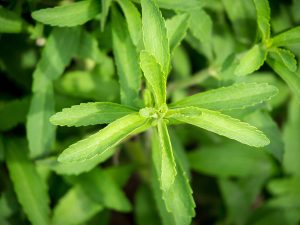Stevia plant grows in Brazil and Paraguay, where people have used its leaves to sweeten the food and for medicinal purposes. It’s renowned to heal minor burns, stomach problems and colic. As processed sugar contains calories that can harm your health, most people are now introduced with stevia a sugar substitute.
Experts claim that it is 10 times sweeter than sugar with no calories. This natural sweetener can help to lower blood pressure and helps to reduce diabetes. Considering its exceptional medicinal benefits, US authorities allowed stevia sale in 2008.

Generally stevia is a natural sweetener that is inherent to South America. It is an aromatic plant with mush sweeter than sugar so this is considered to be very beneficial for many health conditions, which may also include hypertension and obesity. In some of the people stevia can also cause allergic reactions.
Stevia is a sweetener that is reasonably low in calories and it ensures not raise your blood sugar level when it is consumed, although it’s hyped benefits, however, there are reports of the possible side effects that may cause you allergic reactions and may also occur from ingesting stevia.
If you are having any concerns or worries, then you must firstly speak with your doctor or with a medical professional before, you include it into your daily diet.
But, excess consumption of stevia may trigger allergic reaction. You can’t expect your body to function well without certain amount of calories. You need a balanced diet of glucose and fructose. (Lauren a blogger shares why she quits stevia here)
Also read: Cinnamon Allergy Symptoms
Stevia allergy symptoms appear when our immune system mistakenly attacks proteins in stevia. Histamines released by this reaction results in different symptoms ranging from mild to severe. Other foods that have same ingredients like stevia may trigger allergic reaction that includes bananas, watermelon, sunflower seeds and tomatoes.
It’s not necessary that these foods will stimulate allergy in everyone. Symptoms and irritants may differ from person to person.
In very rare cases stevia allergy leads to life-threatening condition, commonly known as anaphylaxis.
Mild allergy symptoms
- Difficulty in swallowing and breathing
- Hives, pale skin
- Wheezing
- Dizziness and weakness
- Swelling of lips, mouth and throat
- Nausea, vomiting
- Tingling sensation in mouth
Stomach Issues
Stevia consists of two major sweet compounds, Stevioside and Rebaudioside A. Mostly experts consider stevioside while research. This compound can cause upset stomach, nausea and decrease in appetite.

Stevia can also cause you a severe allergic reaction, which is called as anaphylaxis, but this is a comparatively infrequent occurrence. Conversely the people with pre-existing allergies to chrysanthemums, ragweed or daises, marigolds are at greater risk of a stevia reaction to the peoples.
The symptoms of an allergic reaction may also include shortness of breath, general weakness, stomach problems, after consuming stevia.
Stevia is usually used as natural sugars auxiliary for the people those who are following the diet for losing their weight. Though, consuming of highly refined stevia can be leading to feel you misleading sensation and nausea of fullness in some of the peoples those who are suffering from the stevia allergy.
Stevia is also containing some of the steviosides that may aggravate your stomach and can also cause you other problems for the digestive system, which may also including a decreased appetite and bloating.
If you are experiencing these symptoms only slightly, then immediately you must stop taking stevia and speak with your doctor if these symptoms do not stopover shortly.
If these symptoms persist, you must consult doctor immediately.
Must read: Hazelnuts allergy
Hay Fever
Stevia plant belongs to ragweed family. If you’re allergic to ragweed then you’ll experience hay fever, which include itchy, watery eyes, runny nose and sneezing. Antihistamines can relieve you from these symptoms. (1) But, consult your doctor before consuming it.
Metabolism Issues
As mentioned above, your body needs a balanced diet to function effectively. Zero calories in stevia may reduce the ability of your body to break food into energy.
Stevia can’t help in the formation of glycogen. It’s a storage form of glucose that can be used when blood sugar level is low. When your body fails to form this storage, it converts muscle protein and fat into glucose. If this continues, you’ll shortly gain abdominal weight.
Treatment
The treatments for the oral allergies to stevia are limited. If you are having a mild allergic reaction, such as runny nose, mild tingling or swelling in your lips, for this allergic reactions antihistamine can be obliging to the people to get release from the stevia allergy symptoms.
If you are having more severe reaction such as anaphylaxis or severe facial swelling than the treatment will be including an emergency injection of epinephrine and an emergency medical care.
If one of you is suffering from the allergic reactions which are caused by the stevia, they should at firstly talk with their doctor or allergy specialist about the emergency epinephrine injectors.
Note: Don’t come to conclusion that stevia can’t help anyone. It may be beneficial for most people, you must consult your doctor and follow the prescription to prevent stevia allergy

